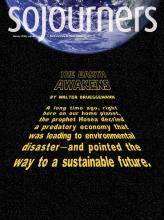THE YEAR IS YOUNG AGAIN. Folks are making soon-to-be-broken New Year’s resolutions. Why not preachers? Resolved: Prepare to preach far enough in advance that the Holy Spirit has some time to work with me. Preachers I admire sketch an entire year out in advance. Pastor Ken Shigematsu at Tenth Church in Vancouver, B.C., suggests that we’re creative on 10-day cycles. So he begins working in earnest on a sermon 10 days before he preaches it. Whatever system you come up with, resolve not to preach “Saturday night specials.” Sure, the adrenaline is nice, but it’s as hard to be creative on demand as it is to be intimate on schedule. That way, when you have a brilliant insight you can see that it fits, say, 10 weeks from now, and that insight is not lost if it fails to live up to the demands of a sermon to be preached in 10 hours.
Epiphany is one of our best, most underutilized words. The chapel at our seminary is blessedly named Epiphany chapel. For no actual connection to God happens in preaching without the illuminating light of the Spirit. I like to preach through the old hymn “We Three Kings” at least once during Epiphany. It reminds us who God is: God is born in our flesh, hailed as prophet and as king, and will die at our hands. Especially during an election year in the United States, when many ridiculous things will be said about God, we do well to remember these particular claims about who God is.
Read the Full Article

